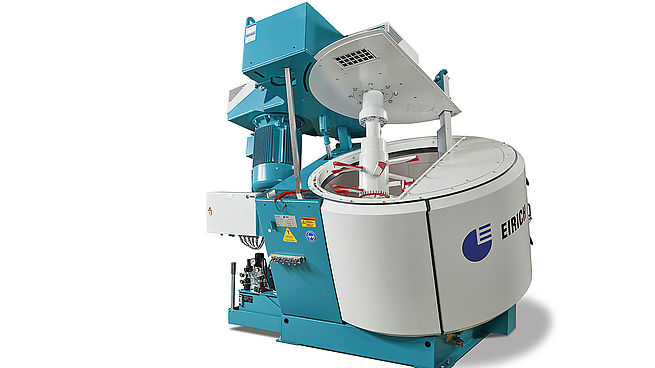EIRICH Mixers Excel with Polymer Concrete

Industrial production of construction elements (e.g. pipe) made of cement-based concrete began in Europe around 1850. 100 years later when the chemical industry was able to provide suitable synthetic resins, cement-free polymer concrete was introduced as a "reactive resin molding material with filler". Initially used primarily for repairs and special applications, the material, which is sometimes called "mineral cast", is now found in a broad range of applications. However, the use of self-curing synthetic resin places special demands on the mixers, and the advantages of EIRICH mixers become readily apparent.
Polymer concrete has high mechanical strength and good chemical resistance. It has been used for years in many different applications. Because this material resists corrosion and deformation, it is used on a large scale for channels, pipes and shafts in the sewage sector. Polymer concrete is also now used to make bulk containers and tanks as well as outdoor products such as seating elements and sports equipment. It can also be used to make machine bases and industrial flooring which, for example, have a marble pattern. Over the past several years, furniture, wall panels and sanitary objects including sinks made of polymer concrete featuring a variety of decorative finishes have appeared on the market. More recently, polymer concrete with desert sand as the base has been proposed as a building material for emergency shelters using the Lego house construction concept. During production of polymer concrete, dry mineral materials such as sand, aggregates, pulverized limestone or lightweight aggregates such as perlite, expanded clay and foam glass are mixed with a blend of reactive resins, hardeners and accelerators. The mixture is then poured into a mold and compacted using vibration. Once they have hardened, the molded elements are ready to use.
Producers need mixers with two important characteristics: The machines should mix as much inorganic material as possible into the resin. Secondly, the mixers should be easy to clean, and the mixing chamber should be readily accessible. With faster cleaning, hardening times can be reduced, and the molds can be used again more quickly.
EIRICH mixers have proven to be extremely efficient in many applications like this in recent years. Due to the system design, aggregates of any grain size and density as well as inorganic fibers can be quickly blended into the organic binder. No pre-mixing of the resin and hardeners is needed. In most cases, the mixing time can be reduced compared to other mixers. The amount of solid content can be increased, and less binder is needed. Difficult aggregates such as graphite and color pigments can be quickly mixed in without problems. The fact that the mixers with capacities between 1 liter and 3,000 liters have only one moving mixing tool makes cleaning easier. Because of the way the systems are designed, fewer mixing tools which run along the bottom and walls are needed compared to other mixing systems. The result is less wear and higher availability.
Modular design makes it possible to vary the lining of the mixing pan and the material composition of the mixing tool, which is another advantage. Depending on the colors and materials being processed, wear-resistant steel and non-stick coatings such as PU and PE as well as ceramics and carbide can be selected. The linings and wear-protection solution can be configured to ensure that the most demanding expectations are met either by the color brilliance or by ease of cleaning or high wear resistance.
For easy access to the mixing pan during cleaning, the tool can be raised on the mixers which are used in these applications. EIRICH mixers with capacities between 1 liter and 900 liters are currently available (see photo) to the industry.
Mixers have been delivered recently to two well-known polymer concrete manufacturers who can now produce more efficiently. It can be assumed that the obvious advantages will lead to the expanded use of EIRICH mixing technology in the industry. Test Centers are available at all EIRICH sites. Anyone interested can experience the advantages using their own formulations.
More information:
Contact: Stefan Berberich, e-mail: stefan.berberich@eirich.de